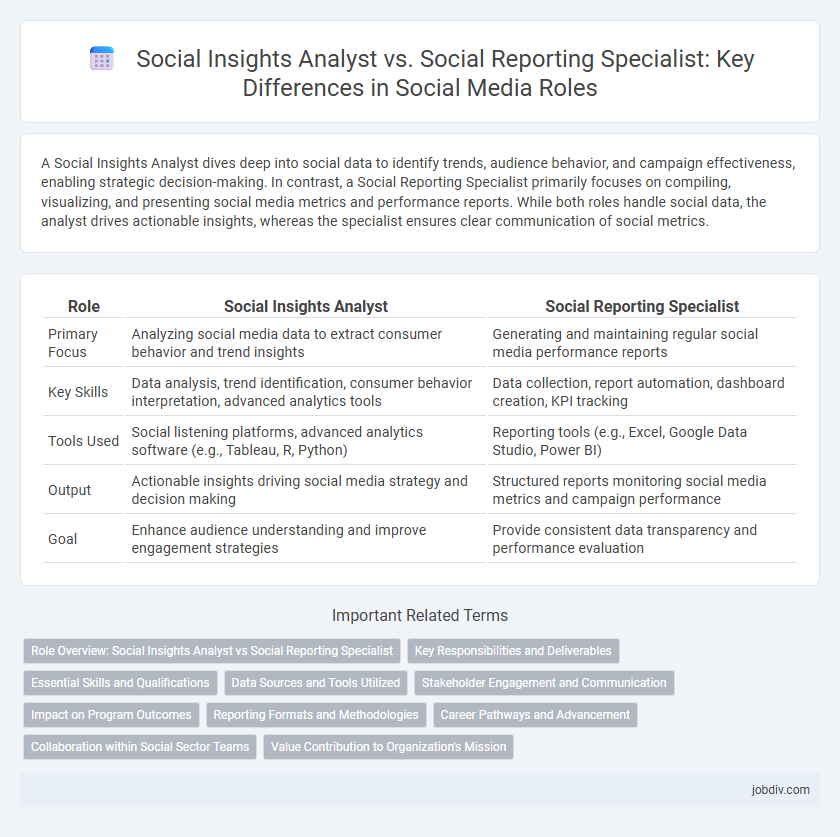A Social Insights Analyst dives deep into social data to identify trends, audience behavior, and campaign effectiveness, enabling strategic decision-making. In contrast, a Social Reporting Specialist primarily focuses on compiling, visualizing, and presenting social media metrics and performance reports. While both roles handle social data, the analyst drives actionable insights, whereas the specialist ensures clear communication of social metrics.
Table of Comparison
| Role | Social Insights Analyst | Social Reporting Specialist |
|---|---|---|
| Primary Focus | Analyzing social media data to extract consumer behavior and trend insights | Generating and maintaining regular social media performance reports |
| Key Skills | Data analysis, trend identification, consumer behavior interpretation, advanced analytics tools | Data collection, report automation, dashboard creation, KPI tracking |
| Tools Used | Social listening platforms, advanced analytics software (e.g., Tableau, R, Python) | Reporting tools (e.g., Excel, Google Data Studio, Power BI) |
| Output | Actionable insights driving social media strategy and decision making | Structured reports monitoring social media metrics and campaign performance |
| Goal | Enhance audience understanding and improve engagement strategies | Provide consistent data transparency and performance evaluation |
Role Overview: Social Insights Analyst vs Social Reporting Specialist
A Social Insights Analyst interprets social media data to identify trends, audience behaviors, and strategic opportunities for brand growth, leveraging advanced analytics and qualitative analysis techniques. In contrast, a Social Reporting Specialist focuses on compiling and presenting social media performance metrics, delivering regular reports to track KPI progress and inform decision-making processes. Both roles require proficiency in social media analytics tools, but the Insights Analyst emphasizes data-driven strategy, while the Reporting Specialist prioritizes accurate data visualization and communication.
Key Responsibilities and Deliverables
Social Insights Analysts focus on analyzing social media data to extract actionable trends, audience behaviors, and competitive intelligence, delivering detailed reports that guide strategic decision-making. Social Reporting Specialists concentrate on generating accurate, consistent social media performance reports by tracking key metrics, campaign results, and engagement rates to support marketing and communication teams. Both roles require proficiency in data visualization tools and social analytics platforms, but Insights Analysts emphasize deep analysis while Reporting Specialists prioritize structured data presentation.
Essential Skills and Qualifications
A Social Insights Analyst excels in data interpretation, trend analysis, and advanced statistical tools like Python or R, requiring strong analytical thinking and a background in marketing or data science. A Social Reporting Specialist focuses on generating clear, concise reports using platforms such as Google Analytics and social media management tools, demanding proficiency in data visualization and communication skills. Both roles necessitate expertise in social media metrics and a deep understanding of audience behavior for strategic decision-making.
Data Sources and Tools Utilized
Social Insights Analysts leverage advanced data analytics platforms such as Tableau, Google Analytics, and social listening tools like Brandwatch to extract deep behavioral patterns and sentiment insights from diverse social media data streams. Social Reporting Specialists primarily utilize reporting software and dashboards, including Excel, Sprout Social, and Hootsuite, to compile and visualize performance metrics and engagement statistics for straightforward client presentations. The distinction lies in the Insights Analyst's emphasis on exploratory analysis and predictive modeling, while the Reporting Specialist focuses on accurate, timely data aggregation and communication.
Stakeholder Engagement and Communication
Social Insights Analysts leverage advanced data interpretation to provide actionable recommendations, fostering deeper stakeholder engagement through tailored communication strategies. Social Reporting Specialists focus on delivering clear, concise reports that translate social data into accessible insights, ensuring stakeholders receive relevant information efficiently. Both roles prioritize effective communication but differ in their approach--analysts emphasize strategic insights, while reporting specialists concentrate on structured data presentation.
Impact on Program Outcomes
A Social Insights Analyst leverages data-driven analysis and behavioral trends to optimize program strategies, directly enhancing targeted outreach and engagement effectiveness. A Social Reporting Specialist synthesizes social metrics into comprehensive reports, providing critical feedback loops that inform continuous program refinement. Both roles contribute to improved program outcomes, but the Analyst's predictive insights often drive more strategic decision-making.
Reporting Formats and Methodologies
Social Insights Analysts utilize advanced analytics tools and diverse reporting formats such as dashboards, heat maps, and predictive models to interpret social data trends and consumer behaviors with precision. Social Reporting Specialists focus on standardized reporting formats like weekly or monthly performance summaries, utilizing consistent methodologies for accurate data collection and presentation. Both roles employ methodologies such as sentiment analysis and engagement metrics, but Insights Analysts emphasize deep qualitative interpretations while Reporting Specialists prioritize clarity and regularity in data reporting.
Career Pathways and Advancement
A Social Insights Analyst focuses on interpreting complex social data to guide strategic decision-making, often advancing into roles such as Social Media Strategist or Market Research Manager. In contrast, a Social Reporting Specialist specializes in compiling and presenting social media metrics, typically progressing toward senior reporting or analytics project leadership positions. Career pathways for analysts tend to emphasize strategic influence and data-driven insights, while reporting specialists often advance through technical expertise and data visualization mastery.
Collaboration within Social Sector Teams
Social Insights Analysts leverage data analytics to uncover trends and behaviors, driving strategic decisions for social sector teams. Social Reporting Specialists focus on compiling and communicating these findings through clear reports that inform stakeholders and support ongoing initiatives. Effective collaboration between these roles enhances data-driven storytelling and maximizes impact across social programs.
Value Contribution to Organization's Mission
A Social Insights Analyst leverages data analytics and consumer behavior trends to provide actionable recommendations that drive strategic marketing and enhance customer engagement, directly contributing to organizational growth. In contrast, a Social Reporting Specialist focuses on compiling and delivering accurate, timely social media performance reports that support decision-making processes and ensure transparency in communication. Both roles are essential for aligning social strategies with the organization's mission, but the Insights Analyst offers deeper value through data-driven strategy development.
Social Insights Analyst vs Social Reporting Specialist Infographic

 jobdiv.com
jobdiv.com